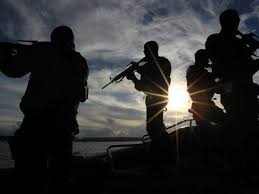
In a document issued earlier this month, he tables a two-year plan under which fewer than 5,000 mercenaries and under 100 aircraft would be used.
This would bring the total cost of the US effort to less than $10billion a year.
“We’re spending too much in Afghanistan and it’s making the insurgency worse, through corruption and leakage to the Taliban,” Prince, a former Navy Seal, told FT.
Based on current spending, he said, the Afghan campaign would cost the country $45bn this year and $50bn next.
“I then heard about a big troop surge [proposal] and I thought that was a dumb idea . . . I’m going to contract everything; I’m going to get down to some spending sanity.”
Blackwater revisited
Just last week, Central Intelligence Agency Director Mike Pompeo paid a visit to Afghanistan to assess US strategy and consider how Prince’s proposal might fit into it, FT said, quoting two sources. The agency did not comment on the proposal.
Ominously, Prince has also proposed putting Afghanistan “through a bankruptcy” and appointing a trustee akin to a viceroy from the days of the British empire.
Blackwater controversy
Prince was once the darling of the US government, which paid his company more than $2bn to provide military support in Iraq, Afghanistan, and elsewhere.
The contractor, however, became embroiled in controversy for the massacre of 14 unarmed Iraqi civilians by the company’s operatives at a Baghdad traffic circle in 2007.
Three years later Prince sold the company, which has since changed its name twice. It is currently known as Academi.
Vested interest?
The US has more than 8,000 troops in Afghanistan. Pentagon proposals include a minor surge of close to 4,000 more to help stem a resurgent Taliban and support the Kabul government, which controls less than 60 per cent of territory, but Trump is considering total withdrawal.
Those familiar with internal debates say Trump wants to save manpower and money and avoid getting sucked into wars, which was one of his election promises.
But Prince, whose sister is Trump’s Education Secretary Betsy DeVos, appears to be able to count on support from Steven Bannon, the White House chief strategist who has previously advocated for the “deconstruction of the administrative state”, and also some voices in the CIA.
The proposal
Prince, who expects to present his revised and updated plan to the White House, is critical of the US approach to Afghanistan, where the Nato mission has rotated through 17 commanders in 15 years.
While US soldiers sent to Afghanistan are regularly young, inexperienced and serve only a single short tour, Prince says his band of experienced sergeants would serve alongside Afghan soldiers on the front line for the long haul, embedding into more than 91 battalions.
Return of Blackwater to Afghanistan?
These contractors would not replace the 2,000-strong US forces operation to combat terrorism, only the US-led Nato advisory mission to the 350,000-strong Afghan national security forces, he said.
Prince proposes they would rotate in for 90 days at a time, returning to the same battalions after 60 days leave.
Paid over $500 a day, the forces would be drawn not only from the US but also from the UK, Germany, France, Sweden, South Africa and Australia, he said.
Critique
Some people familiar with the proposal praise its emphasis on efficiency and results, but questioned the ethics and complexities of private military forces, adding that Defence Secretary Jim Mattis, a former general is unlikely to back such a plan.
“He’s done his homework, but there are a lot of loopholes — he’s looking at this totally from a business perspective and nobody should be looking at a war that way,” said a person who has seen the plan and says the numbers are “highly exaggerated”.
“If contractors are replacing soldiers and are on the frontline, they could kill or be killed, there could be kidnaps or insider attacks. What happens if they commit a crime or bodies have to be sent back? There would be a large number of legal complications.”
Afghan lens
While Afghan officials appreciate the prospect of a boost to their air power, some worry the prospect of a hired army would play into the hands of Taliban recruiters who would frame the war as one against mercenary invaders.
Pakistan doing everything to bring Taliban, Haqqani network to peace talks: Aizaz
Prince said that his men would be embedded with Afghan counterparts, and planes emblazoned with Afghan insignias, so they would not be 'mercenaries', according to the UN definition, but rather part of the Afghan Army.
Afghan Ambassador to the US Hamdullah Mohib said the Afghan government had not yet taken a view. “We are reserving judgement until there is a formal policy decision,” he said.
But he cautioned the delays are hampering efforts to bring peace in Afghanistan. “Any lack of clarity about the level of commitment of Afghanistan’s partners tends to embolden our common enemies and delays their defeat,” he said.
1724760612-0/Untitled-design-(12)1724760612-0-405x300.webp)









1731838555-0/BeFunk_§_]__-(5)1731838555-0.jpg)






COMMENTS
Comments are moderated and generally will be posted if they are on-topic and not abusive.
For more information, please see our Comments FAQ